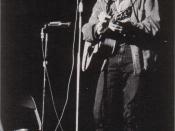In the 1960's, Bob Dylan was quoted as having said, "Don't ask me nothin' about nothin'. I just might tell you the truth." This has been the maxim of his life, and his career. Dylan has always been known for saying what he feels, even when it goes against popular belief. He has revolutionized folk and rock music, bridging the gap that separated the two. He brought poetry to rock, and his songs created a voice for people who were frustrated with government and society. His career has endured forty years since the release of his first album, and it is continuing on even today.
Bob Dylan, whose given name was Robert Allen Zimmerman (he legally changed his name in 1962), was born May 24, 1942, in Duluth Minnesota. His family moved to Hibbing, Minnesota when he was six years old. There, he learned to play the guitar and the harmonica, and he formed a band by the name of the Golden Chords while he was in high school.
He enrolled in the University of Minnesota in 1959, and there, he started performing in coffee houses on his own. In 1961, Dylan moved to New York because he wanted to meet his life-long idol and foremost influence, Woody Guthrie. Guthrie was in a hospital in New Jersey, and Dylan went there to visit him frequently. That same year, Dylan performed the opening act for John Lee Hooker at Gerdes' Folk City in New York, with a set of songs that had a strong Guthrie flavor. He was signed on with Columbia Records when a representative of the company read his review in the New York Times. His career moved quickly, and three years later, he was playing 200 concerts a year. He produced numerous albums that dealt with protest issues,


